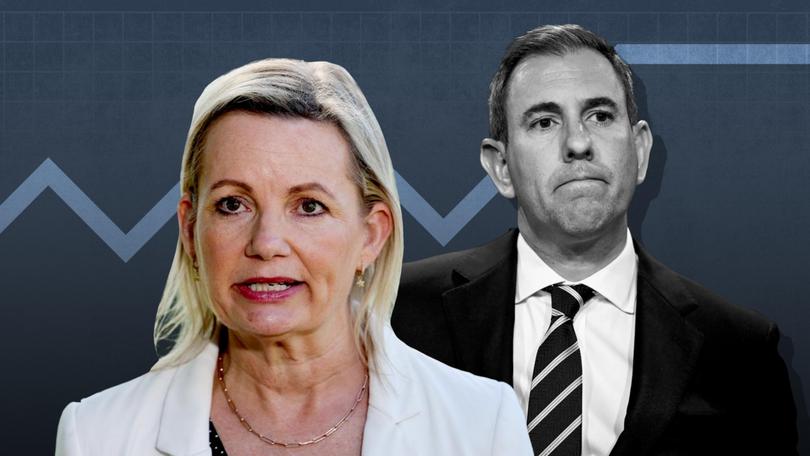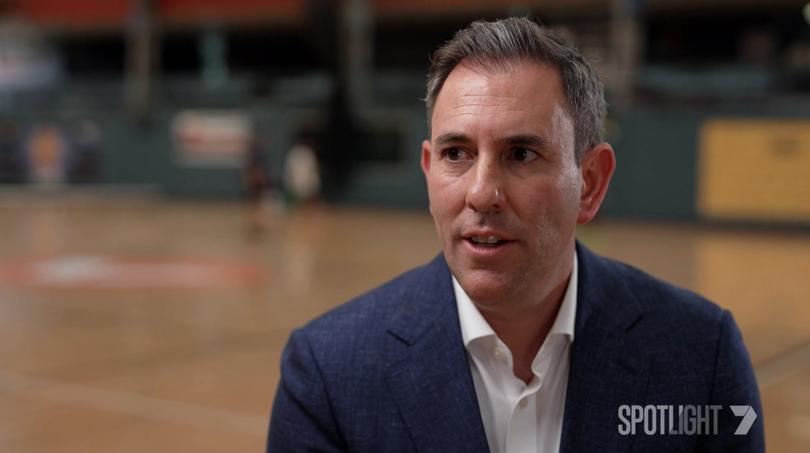‘Smoke and mirrors’: Liberal MP Sussan Ley accuses Treasurer Jim Chalmers of shifting blame for inflation
A leading economist says Jim Chalmers’ efforts to blame the inflation crisis on the Middle East is a deliberate distraction from rampant government spending.

A leading economist says Jim Chalmers’ efforts to blame the inflation crisis on the Middle East is a deliberate distraction from rampant government spending.
The Treasurer, who is attending a gathering of finance leaders in Washington DC, on Thursday warned an escalation in Israel’s war against Hamas in Gaza and Hezbollah in Lebanon could further destabilise the world’s economy.
But AMP chief economist Shane Oliver said those comments were an attempt to divert from the “home-grown” causes of inflation.
Sign up to The Nightly's newsletters.
Get the first look at the digital newspaper, curated daily stories and breaking headlines delivered to your inbox.
By continuing you agree to our Terms and Privacy Policy.“I think he’s trying to distract attention. Governments do that,” Dr Oliver said.
“They try and say ‘it’s global’ and point to the war in Ukraine and the Middle East, whereas we have a big element of homegrown inflation and governments have contributed to that by spending lots of money.
“Most countries around the world — the US, Europe, Canada — they’ve all got their inflation rates down to around their targets . . . that suggests that it’s far less of a global problem now.”
Dr Oliver said while the average Australian had cut their spending amid elevated interest rates, as the Reserve Bank intended, government spending had been persistently high at a State and Federal level.
He noted this, along with population growth, has kept demand above supply.
Dr Oliver said the war in the Middle East could lead to persistently high oil prices and a prolonged inflationary spike — but only if Israel struck Iran’s oil reserves.
Such an action would likely prompt Iran to launch a retaliatory strike on Gulf-state oil fields, but the Netanyahu Government has so far indicated it would contain its response to Iranian military targets.
“Unless you disrupt the oil supplies, it remains like the war in Ukraine or Sudan — horrible but not inflationary and not necessarily consequential in terms of global growth,” Dr Oliver said.
Dr Chalmers on Thursday warned more bloodshed is “one of the biggest threats to the global economy”, saying: “A broader war could put upward pressure on oil prices, prolong the fight against inflation and threaten the soft landing that we all seek.”
The comments came after damning reports from the International Monetary Fund, which has projected Australia’s inflation would stay above 3 per cent in 2025 and would have the second highest inflation in the developed world, behind only Slovakia.
Deputy Liberal leader Sussan Ley accused the Treasurer of employing a “smoke and mirrors” trick.
“He’s suggesting that the inflation that we’re seeing at home is because of factors overseas,” she told Channel 7’s Sunrise program on Friday.
“The problem is that the UK, the US, Canada, and New Zealand, are all seeing inflation come down.”
Ms Ley said the “problem” in Australia was the Labor’s “lack of an economic plan,” which was “causing Australians to feel pain for longer”.

However, Commonwealth Bank of Australia chief economist Stephen Halmarick said the war as “definitely a factor” in lingering inflation.
Mr Halmarick agreed it had impacted oil prices, as well as also container shipping due to the closure of the Red Sea and Suez Canal.
The CBA’s inflation projections are lower than those of the IMF or RBA, with the bank currently forecasting a rate cut in December.
This would depend on inflation figures, due Wednesday, revealing a quarterly price rise of 0.7 per cent or lower, Mr Halmarick said.
Mr Halmarick said Australia had made a policy choice that had led to more inflation for longer, but had also avoided a recession and saved jobs.
“Government spending means the economy is stronger than it otherwise would have been, and therefore inflation is a little bit higher and interest rates are a little bit higher. But it’s equally true to say that without government spending, we would be in recession,” Mr Halmarick said.
Education Minister Jason Clare responded that war, both in Europe and the Middle East, had an economic impact.
The minister pointed to fresh employment data that showed a million jobs had been created since the election and the reduction of the inflation rate from 6 to 3 per cent since the election.
Originally published on The West Australian
